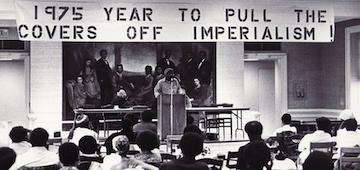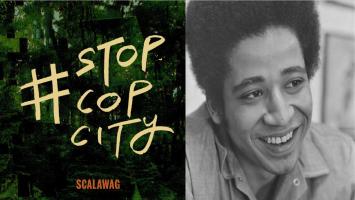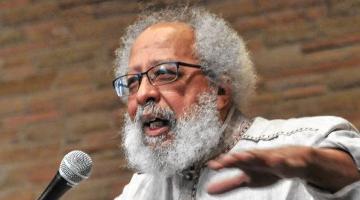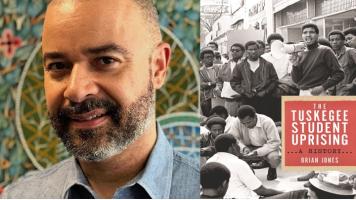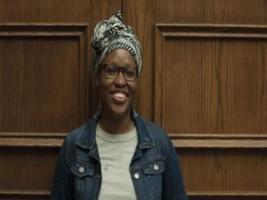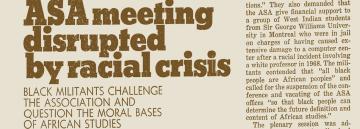Was Black Studies doomed to fail? Revisiting a critical take on its origins.
US “Black Studies” was incorporated into many white institutions more than fifty years ago. But one could argue that this Black Studies project was co-opted at birth, snatched from the streets and domesticated in the white academy’s golden pens, creating a class, not of scholars and teachers, but of hustlers and pimps.
This is, in part, what radical poet and publisher Don L. Lee (now respectable writer Haki R. Madhubudti) argued in his 1970 essay “The New Pimps or, It’s Hip to be Black: The Failure of Black Studies.” “The New Pimps” was published in the premiere issue of The Black Position, a Detroit-based Black Arts journal edited by Gwendolyn Brooks and published by Broadside Press. The essay is harsh, deeply cynical, occasionally funny, and, unfortunately, its language represents some of the problematic, lesser moments of the 1970s. It is also often depressing.
Lee argues that there “was never really a serious commitment made by white universities” to Black studies. These universities not only appointed “inadequate and inexperienced personnel” to these programs, but also that white university administrators “played the waiting game, only giving and taking when it was absolutely necessary.” Lee calls out the credential-less and charlatanistic individuals brought on by the white establishment who seized on the Black Studies moment to advance their careers. He decries the utter naïveté of those Black scholars who misread the game of money, status, and power by which the white university neutralized Black demands: “As black students demanded everything from soul food to black dorms, the universities were coolly planning five to ten years ahead.”
Today, we can see how prescient parts of Lee’s analysis were. Black Studies at many of these white universities has been unmoored from Black communities; the project has become both neoliberalized, where anyone with a couple of million dollars can buy it (Hello, Harvard!); and many Black scholars have been complicit in “pimping” Blackness at the expense of the Black community and real ideological and material change.
What makes Lee’s analysis especially devastating is that in 1971 he clearly identified what would become the crisis of Black Studies today. After fifty years, it may be time to reconsider Black Studies’s mission. Don L. Lee’s essay is reprinted below.
The New Pimps or, It’s Hip to be Black: The Failure of Black Studies
Don L. Lee
Our problem is not that we don’t realize that we have a problem; our problem is that we don’t realize we all have the same problem. The formulation of black or African-American studies programs at today’s white colleges and universities is only one of the super-mistakes made in the Sixties. The future of African-American studies has been predicted and should not be seen as accidental by any means.
The fact of the matter is that you cannot build without a foundation and foundations are not established unless you have sound, serious and committed people. Sound:
Sound: in the profoundest sense knowledge-able intones field of study and not threatened by staff faculty members and others, secure to the point where one’s ego can be subordinated so as not to be harmful to the wishes and aims of the organization. Serious: understanding priorities, willing to prepare and work to accomplish priorities. Committed: to the point of a new lifestyle, to the point of new values, ideals and goals: committed indeed to work that could be considered dangerous, dangerous in the sense that you’ll be challenging the images of that which controls the world. The world-runner. The white boy.
Doomed to Failure:
During the latter part of the Sixties, in just about every college that contained a sizable number of black students (sixteen or more) a push for black or African-American Studies was initiated. The problem, other than inadequate planning and lack of foresight, was that we did not have enough competent people to fill all the positions opening up all over the United States. Everybody and his momma were talking black studies and studying blackness as though it was something new, and it was to most of those who were doing all the talking—so new that they actually believed what they were doing was right, necessary.
To quickly put this in a proper context, blackness and African studies are nothing new. They are new if you’ve never been exposed. That was the problem; few if any of the proponents of black studies had ever been exposed to any serious study of the black world and its inhabitants. What we had coming into lead and teach were five year masters, just out of school yesterday (European studies, Humanities, French or physical Education, etc.) who hadn’t heard of blackness and didn’t want any part of it until it was safe and profitable. But, to add oil to fire, we had brothers and sisters who for the last five to eight years were being trained as European-Americans. To come into blackness in many cases was something uncertain, queer and quite alien. They couldn’t handle it. They were psychological misfits who could not adjust fast enough and therefore couldn’t possibly be given any type of positive direction because they didn’t have any themselves. If you’ve been an imitation white boy for the last twenty-six years out of a twenty-six year life span, how could you become black overnight?
Not only was there a problem of inadequate and inexperienced personnel, there was never really a serious commitment made by white universities. They all played the wait and see game, only giving and taking when it was absolutely necessary. As black students demanded everything from soul food to black dorms, the universities were coolly planning five to ten years ahead. They had the main ingredients for disruption on their side: Money and power.
Money emerged as a major obstacle. Yes, money, but not real money and only money in the sense that it was money to those who didn’t understand the use of money and what real money is. Here were black births or sisters who had been in school for the last six to eight years and in all likelihood had come from poor black families. And if you ain't’ never had nothing, being confronted with a salary ranging from thirteen thousand to twenty thousand will make most black people say yes, regardless of qualifications — and the main qualification was that the participants be black (in color only) because there were few people around who even had the competence to judge prospective staff and faculty members.
But that’s only part of it. We must not forget that our new black staff members, directors and assistant directors were trained to be European-American and that upon receiving salaries equal to their counterparts, they immediately sought a new level of living — a level consistent with thirteen to twenty thousand dollars. So, in effect, we witness the making of a new bourgeoisie, a new elite. Instead of Cadillacs and houses, we get Mercedes and condominiums. Instead of loud dressing, street talk and the old hustle, we get academic dress, a cool rap with shades of blackness and a black hustle—in other words we get the new pimps, the educated pimps.
If salaries were not problem enough, brothers not understanding administrative budgeting and the economics of running a program found out very soon that the funds allowed for the program fell very short. Soon after many of the programs were initiated, because of ideological differences small power plays erupted in the departments. There were problems concerning who was going to lead. Were they going to be Black Nationalists, Pan-Africanists, Third Worldists, Marxist-Leninists, were they going to be community oriented or not, scholarly or not scholarly? Many brothers not being secure in their own manhood failed to understand the basics of the whole movement: First and foremost we’re black men and women and the conditions under which we function will dictate and format our ideology—which is to say that few of the participants in the early African-American studies programs really understood the black community and even fewer had a historical perspective to work from. Everybody was in the dark except the white boy. He knew exactly what was happening and what was going to happen. After all, the Jews had been “authorities” on us long before we were “authorities” on ourselves.
They walked the danger course and carried young minds with them. The only identity they had was of themselves as individuals, as reflections of European-Americans. They did what they were supposed to do; they did what they had been taught to do. Now, since they’ve acquired a few possessions and something to lose, they become careful and worried about their jobs. Insecure from the beginning because of not being properly prepared, we begin to see that the various staff and faculty members were not able to work and function together as an organization or unit. Not only were they insecure as teachers and scholars, but as black men and women as well. It all came home when they were challenged to produce by the uninhibited and unsophisticated black student they were supposed to be teaching. The new elite couldn’t handle the “street niggers.” The programs didn’t function because there wasn’t nothing there from the get-go, and around the second year, the whites started messing with the money and all we had left was utter confusion posing as black studies. It got so bad at one urban school that a sister confided in me and ended our conversation by saying that she wished a white boy would come in and straighten this mess out. That’s real!
The Ultimate Realization:
The reality of the whole mess is that whatever is accomplished is still in the final analysis the white boy’s. Yes, he paid for it, so it is his. This is to say that if any competent African-American studies program comes out of Harvard, Yale, Cornell, Brown, or what have you, it belongs to those respective schools. This means that all the time, toil and research that go into the development of programs on white campuses are in behalf of the white boy, our supposed enemy. Oh yes, brothers can rationalize by saying, well black students will come to such and such school, so we should be there to direct and aid them.’ Now, no one can argue that point. My point is— is it worth the long range effects? At most, on any given white campus you get five to eight percent black students. This is to say that black studies should be where the majority of black students are — the black schools and black communities. After all, you don’t go to Howard or Fisk University to study Jewish studies; you go to Brandeis or Columbia. Right? The centers of African and African-American studies should be in black institutions.
In terms of white schools, there should be African-American students societies or black student unions as well as black courses integrated throughout the regular curriculum. Also, what is needed is that the white schools set up exchange programs. Why couldn’t Harvard have exchange programs with the Institute of the Black World or another competent black institution? If this was done, some of the much needed funds from Harvard and other white schools might be channeled into the black community. But, most importantly, you would be helping to build your own institutions—institutions that must be respected and listened to as you respect and listen to Harvard, Yale, etc.
A major setback is that few black people are psychologically or historically prepared to deal with themselves in the context of white schools— the failure and drop-outrage is fantastic. Brothers and sisters who are really concerned should at this point also concentrate their efforts with the pre-school through high school student. No doubt about it, we are ill-prepared; if there is any real expertise, let’s get it into the primary levels. But there is little money there and almost no status! People will not call you professor—only brother.
We have to stop depending upon the white boy to define and legitimize us. To deal with our problem, alone by ourselves in the seventies, is innovative. We need original thinkers who can politically deal with the right and the left (is there really any ideological difference between William Buckley, Jr., and Herbert Marcuse?) We need brothers and sisters who are hip to the world and are able to deal effectively with foreign policy and foreign affairs (How many brothers and sisters know about the Council on Foreign Relations?—a 1,500 member New York organization of, mainly, bankers and lawyers who meet periodically to “ponder” world affairs, such as the real relationship of Ford Motor Company to the State Department. Technology is the watchword. After all, General Motors makes more than cars. Think tanks are nothing new; they’re just new to us. We’ve been a problem and therefore have merited study. We need Grier and Cobbs to study “white rage;” why doesn’t Kenneth B. Clark do a study on white people?
When Report from Iron Mountain was published in 1967, it was overlooked by most black people [Ed. note: the Report was actually an anti-war satire]. However, in its conclusion it didn’t overlook us. We are referred to in the report as “undesirables,” “minority groups,” or “Potential enemies.” The Report put together by some mid-western scientists and thinkers studied the necessity and desirability of perpetual peace. What concerns us about the Report is that it suggests that in order to control the “undesirables” or “potential enemies” of society, a given society must consider “the reintroduction, in some form consistent with modern technology and political processes, of slavery.” Yes, reintroduction of slavery compatible with modern technology and political reality. The point is, if you’re talking about modern technology, in most cases, you don’t need “concentration camps” or “barbed wire” or any other enclosed area. After all, we’ve had the most dangerous weapon of the twentieth century in our home for the last twenty years—television! If you control a man’s mind, you’ve got his body. And that’s where most of our people’s minds are—at a T.V. level. Also, fifty-five percent of black people in this country now live in urban areas. In Chicago where over a million of us exist, we’re confined to less than twelve percent of the land. This is to say that we’re already concentrated.
Quality of life in the black community is already at an all time low. And our new elite, the education pimps, are in effect very selfish slaves being controlled by the same materialism that has been used throughout our history to control us. We now have professional black studies co-ordinators, brothers who travel the country setting up pseudo-black studies programs for anybody for a “modest” fee.
We have enough theoreticians, writers, poets, political scientists and the like; what we need is brothers and sisters who will put the theories into action, action-out the writers’ and poets’ words along with the writers and poets themselves. We have enough leaders leading us no place. And yes we know that we’re a bad people; we so bad that we badly organized, badly situated and badly taught as we loosely talk about nationbuilding like it's something that will jump out of the sky. If the white boy gave us a block tomorrow, we’d have problems running and organizing it.
We need a true building ideology (which will embody our spiritual and moral reality.) We need to develop a standard of living compatible with the work that needs to be done. If you make thirteen thousand dollars, try to live on eight thousand dollars and put a good portion of the remaining five thousand into one constructive community effort. Seek out and find brothers and sisters in your area who are trying to accomplish the real. Prepare yourself; widen your field; become the best. Remember you reflect what you are. You are the community and the community is you. In the final analysis, there is no difference between the Ph.D.’s and the pool players and we all need the study of blackness, the study of ourselves. Our problem is not that we don’t realize that we have a problem: our problem is that we don’t realize we all have the same problem.
Don L. Lee, “The New Pimps or, It’s Hip to be Black: The Failure of Black Studies, The Black Position, No. 1 (1971).

